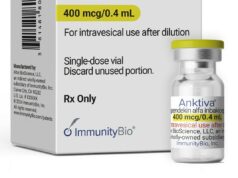
Neurons die. It’s a hallmark of amyotrophic lateral sclerosis and other neurodegenerative disorders, but drug developers have been mostly stymied in their attempts to help these nerve cells survive. Amylyx Pharmaceuticals designed its experimental therapy to address pathways leading to neuronal cell death, and the company announced Wednesday that the FDA has accepted its new drug application. The agency set a June 29, 2022 target date for a decision.
Acceptance of the drug application sets up a busy first half of 2022 for Cambridge, Massachusetts based Amylyx. The FDA placed Amylyx’s drug application under priority review, a designation reserved for medications that could offer significant improvements in the treatment of serious medical conditions. Before any FDA decision, the company said the regulator plans to convene a meeting of independent experts to discuss the safety and efficacy of its drug, AMX0035. The date for this advisory committee meeting has not yet been set. By then, Amylyx might already be a public company. Earlier this month, the biotech filed IPO paperwork with securities regulators.
In its IPO filing, Amylyx said that while most cells in the body regularly die and are replaced, mature neurons normally resist cell death, but they generally cannot regenerate. Their death is triggered by the activation of multiple stress factors, many of them stemming from dysfunction of the endoplasmic reticulum, a cellular network that plays a role in making, modifying, and transporting proteins. Amylyx aims to improve neuronal survival by addressing problems with the endoplasmic reticulum and mitochondria, which are energy-producing components of cells.
Mitochondria start the cell death cascade when they detect sufficient cell damage, Amylyx said in its filing. This process includes the recruitment of certain proteins. Amylyx’s ALS drug is comprised of two small molecules, tauroursodeoxycholic acid and sodium phenylbutyrate. By using both molecules to block a key cell death protein, Amylyx said its drug has the potential to raise the threshold for cell death and lead to longer survival of neurons. In lab tests and preclinical models of ALS, Alzheimer’s disease, and multiple sclerosis, Amylyx said its drug can keep neurons alive under various conditions and stresses. Tauroursodeoxycholic acid and sodium phenylbutyrate are not proprietary to Amylyx, but the company’s intellectual property includes a fixed-dose combination of the molecules.
“We believe that our proprietary combination of these two mechanisms of action will allow us to target abnormal cell death to better prevent neurodegeneration than treatment with either mechanism of action alone,” Amylyx said in the filing.
Amylyx’s submission for AMX0035 is based on data from a placebo-controlled Phase 2 clinical trial that enrolled 137 patients. The 24-week study met the main goal of slowing disease progression as assessed according to a scale measuring physical function of ALS patients. Following the trial, study participants continued on to an open label extension study. Participants who had started on the Amylyx drug during the blinded study and continued the treatment in the extension study had a 44% reduction in the risk of death compared to placebo group participants who started treatment during the extension study, Amylyx reported. Furthermore, those who initially started on the study drug lived, on average, 6.5 months longer than those who had started on the placebo. Full study results were published in September 2020 in the New England Journal of Medicine.
Earlier this year, the FDA told Amylyx it needed to conduct Phase 3 study before seeking regulatory approval. But over the summer, several discussions with the agency opened the door for the company to file a drug application based on the Phase 2 results. Amylyx submitted the application in November.
AMX0035 is Amylyx’s lead drug candidate and so far, it is the biotech’s only drug candidate. The company aims to test its approach to improving neuron survival as a way of treating various neurodegenerative conditions. In addition to ALS, the company has also reached mid-stage clinical testing of the drug in Alzheimer’s disease. The next disease target is Wolfram syndrome, a rare inherited neurodegenerative disorder. According to the IPO filing, Amylyx expects to submit an investigational new drug application in Wolfram syndrome in the first half of 2022. Drug applications for two additional diseases are also planned for next year. Those diseases were not specified, though the company did say that the Phase 2 test in Alzheimer’s disease “could help us prioritize additional indications to pursue with AMX0035.”
Meanwhile, a Phase 3 clinical trial for AMX0035 is underway in ALS. While that study is not part of the application now before the FDA, Amylyx said that the study is designed to provide additional safety and efficacy data for AMX0035 in ALS, data that will support the company’s efforts to seek regulatory approval in other countries. The drug is currently under review in Canada. Amylyx plans to submit a marketing application in Europe in the first quarter of 2022. The company said it is readying an expanded access program that is expected to launch in coming months for ALS patients who are ineligible for the Phase 3 study.
Amylyx’s IPO paperwork penciled in a $100 million fundraising target. The company has applied for a Nasdaq listing under the stock symbol “AMLX.” According to the filing, Amylyx plans to use the IPO proceeds to fund regulatory and pre-commercial work, and also launch activities if the drug is approved. Some of the cash will go toward the ongoing Phase 3 test of AMX0035 in ALS, as well as development of that drug for other neurodegenerative disorders.
Image: koto_feja, Getty Images








